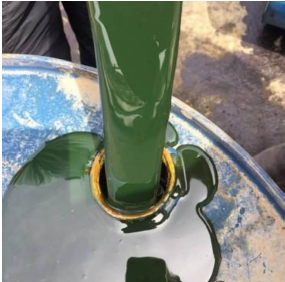Calcium Sulphonate Grease: Guide to Its Properties and Uses
Introduction to Calcium Sulphonate Grease
Properties of Calcium Sulphonate Grease
One of the key reasons behind the popularity of calcium sulphonate grease is its outstanding properties. These properties include:
1. Water Resistance
One of the most remarkable features of calcium sulphonate grease is its superior resistance to water. Whether it’s fresh water, saltwater, or even acidic water, this grease maintains its consistency and does not wash out easily. This property makes it ideal for applications in marine environments or where equipment is exposed to high moisture levels.
2. High-Temperature Stability
Calcium sulphonate grease exhibits excellent high-temperature stability. Unlike conventional greases, it does not melt or run out when exposed to high temperatures. This makes it suitable for use in machinery that operates under high heat, such as in steel mills or automotive brake systems.
3. Mechanical Stability
The mechanical stability of calcium sulphonate grease is another significant advantage. It can withstand heavy loads and high shear forces without breaking down. This stability ensures that the grease stays in place, providing continuous lubrication and protection to the moving parts.
4. Corrosion Protection
Another important property of calcium sulphonate grease is its ability to protect metal surfaces from corrosion. The grease forms a protective barrier that prevents the entry of moisture and other corrosive elements, thereby extending the lifespan of the machinery.
5. Oxidation Resistance
Oxidation resistance is a crucial factor in determining the longevity of grease. Calcium sulphonate grease resists oxidation, meaning it does not harden or become brittle over time. This property ensures long-term lubrication and reduces the need for frequent reapplication.
Applications of Calcium Sulphonate Grease

Due to its versatile properties, calcium sulphonate grease finds application in a variety of industries. Below are some of the common uses:
1. Automotive Industry
In the automotive industry, calcium sulphonate grease is commonly used in wheel bearings, chassis components, and universal joints. Its ability to withstand high temperatures and resist water makes it ideal for these applications, ensuring smooth operation and reduced wear and tear.
2. Marine Applications
Marine environments are notorious for their harsh conditions, including exposure to saltwater, extreme temperatures, and heavy loads. Calcium sulphonate grease is often the lubricant of choice for ship components, such as propeller shafts, winches, and deck machinery, due to its excellent water resistance and corrosion protection.
3. Mining Industry
The mining industry demands lubricants that can handle extreme pressures, heavy loads, and dusty conditions. Calcium sulphonate grease excels in this environment, providing reliable lubrication for mining equipment such as drills, conveyors, and crushers.
4. Steel Mills
Steel mills operate at very high temperatures, making them a challenging environment for conventional greases. Calcium sulphonate grease is highly effective in this setting due to its high-temperature stability and resistance to oxidation, which ensures continuous lubrication of rolling mill bearings and other critical components.
5. Agricultural Equipment
Agricultural equipment often operates in muddy, wet, and dusty conditions. Calcium sulphonate grease is widely used in tractors, harvesters, and other machinery to provide protection against moisture and to ensure smooth operation under heavy loads.
Advantages of Calcium Sulphonate Grease Over Other Greases
What sets calcium sulphonate grease apart from other types of greases, such as lithium or polyurea-based greases? Here are some key advantages:
1. Superior Water Resistance
Compared to lithium-based greases, calcium sulphonate grease offers much better resistance to water. This makes it the preferred choice in applications where the grease is likely to come into contact with water or moisture.
2. Better Load-Carrying Capacity
Calcium sulphonate grease has a higher load-carrying capacity than many other greases. This makes it ideal for use in heavy-duty machinery where the grease needs to withstand significant pressure without breaking down.
3. Enhanced Corrosion Protection
The ability to protect metal surfaces from corrosion is one of the standout features of calcium sulphonate grease. This is particularly important in environments where equipment is exposed to corrosive elements, such as marine or chemical industries.
4. Extended Service Life
The oxidation resistance of calcium sulphonate grease ensures that it does not harden or degrade over time, leading to a longer service life. This reduces the frequency of reapplication and minimizes maintenance costs.
How to Choose the Right Calcium Sulphonate Grease
Selecting the right calcium sulphonate grease for your application requires considering several factors:
1. Operating Temperature
If your equipment operates at high temperatures, ensure that the calcium sulphonate grease you choose has a high-temperature rating. This will prevent the grease from melting or losing its effectiveness under heat.
2. Load Conditions
Consider the load conditions that the grease will need to withstand. For heavy-duty applications, opt for a calcium sulphonate grease with a high load-carrying capacity to ensure optimal performance.
3. Water Exposure
If the equipment will be exposed to water or moisture, choose a calcium sulphonate grease with excellent water resistance. This will prevent the grease from washing out and protect the equipment from corrosion.
4. Compatibility
Ensure that the calcium sulphonate grease is compatible with the materials used in your equipment, such as seals and gaskets. Incompatibility can lead to degradation of these components, resulting in leaks or failures.
Common Misconceptions About Calcium Sulphonate Grease
There are a few misconceptions about calcium sulphonate grease that are worth addressing:
1. It’s Only for High-Temperature Applications
While it is true that calcium sulphonate grease performs exceptionally well in high-temperature environments, it is also suitable for low-temperature applications. Its versatility makes it a great choice for a wide range of operating conditions.
2. It’s Too Expensive
Although calcium sulphonate grease may have a higher upfront cost than some other greases, its long service life and reduced maintenance requirements often result in lower overall costs in the long run.
3. It’s Not Suitable for Light-Duty Applications
While calcium sulphonate grease is indeed ideal for heavy-duty applications, it is equally effective in light-duty settings. Its properties make it a versatile lubricant for a broad spectrum of machinery.
Environmental Impact of Calcium Sulphonate Grease
With growing awareness of environmental issues, the impact of lubricants on the environment has become an important consideration. calcium sulphonate grease has a relatively low environmental impact for several reasons:
1. Biodegradability
Some formulations of calcium sulphonate grease are biodegradable, making them a more environmentally friendly option compared to non-biodegradable greases.
2. Long Service Life
The long service life of calcium sulphonate grease means less frequent reapplication, leading to reduced consumption and lower environmental waste.
3. Corrosion Protection
By protecting equipment from corrosion, calcium sulphonate grease helps to extend the lifespan of machinery, reducing the need for replacements and the associated environmental impact.
Conclusion: Is Calcium Sulphonate Grease the Right Choice for You?
calcium sulphonate grease offers a range of properties that make it an excellent choice for a variety of applications. Its water resistance, high-temperature stability, mechanical stability, corrosion protection, and oxidation resistance make it stand out from other types of greases. Whether you’re operating in the automotive, marine, mining, steel, or agricultural sectors, calcium sulphonate grease can provide reliable lubrication and protection to your equipment.
However, it’s essential to evaluate your specific needs before making a decision. Consider factors such as operating temperature, load conditions, water exposure, and compatibility with your equipment. If these align with the properties of calcium sulphonate grease, it could be the ideal lubricant for your machinery.
By understanding the properties and uses of calcium sulphonate grease, you can make an informed choice that ensures the longevity and efficiency of your equipment, while also potentially reducing maintenance costs and environmental impact.
FAQs

What is Rubber Process Oil? | Guide to Applications, Benefits, and Selection
What is Rubber Process Oil? | Guide to Applications, Benefits, and Selection Discover More In the sophisticated ecosystem of rubber manufacturing, raw polymers are the canvas, but rubber process oil is the essential medium that brings the masterpiece to life. It is the critical component that transforms rigid, unworkable raw materials into the versatile, durable, and high-performance rubber products that define modern industry and daily convenience. For specialists dedicated to chemical innovation and precision, such as the team at Rumanza Lubricants, the science

Which UAE Lubricants manufacturers is Best for High-Mileage Engines?
Which UAE Lubricants manufacturers is Best for High-Mileage Engines? Discover More The sprawling deserts and bustling metropolises of the United Arab Emirates present a uniquely demanding environment for vehicles, pushing engine lubrication technology to its absolute limits. From the scorching summer heat that can cause conventional oils to thin out and lose protective properties, to the endless stop-start traffic of cities like Dubai and Abu Dhabi that promotes sludge and acidic buildup, our cars endure a severe service regimen unlike

What Vehicles Use Kerasene? A Comprehensive Guide
What Vehicles Use Kerasene? A Comprehensive Guide to Fueling Beyond Gasoline Discover More When we think of vehicle fuel, gasoline and diesel immediately come to mind. They are the lifeblood of our daily commutes, the power behind the trucks that deliver our goods, and the standard by which we measure automotive progress. But venture beyond the everyday, into the realms of high-altitude aviation, rugged agricultural machinery, and groundbreaking space exploration, and you’ll discover a different, equally vital fuel that operates

How To Chose Antioxidant Additives in UAE | Industrial Grade Chemicals?
How To Chose Antioxidant Additives in UAE | Industrial Grade Chemicals? Discover More In the heart of a rapidly industrializing region, the United Arab Emirates stands as a beacon of manufacturing, logistics, and heavy industry. From the sprawling automotive workshops of Dubai to the massive petrochemical complexes in Ruwais, the performance and longevity of machinery are paramount. At the core of this operational excellence lies a critical, yet often overlooked, component: industrial lubricants and fluids. These lifeblood substances are constantly

Viscosity Index Improvers UAE – Improve Lubricant Performance
Viscosity Index Improvers UAE – Improve Lubricant Performance Discover More In the heart of the United Arab Emirates, where ambition is matched only by the scale of its infrastructure, the machinery that builds and powers the nation faces a relentless adversary: the climate. The combination of extreme heat, temperature volatility, abrasive dust, and intense UV radiation creates a perfect storm of conditions that relentlessly attack the lifeblood of all mechanical systems—the lubricant. For maintenance managers, plant operators, and fleet owners,